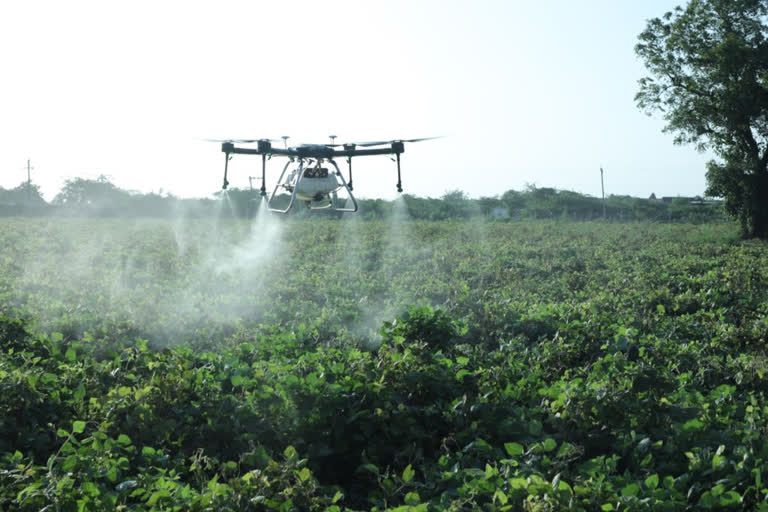New Delhi: India’s largest fertiliser manufacturer Indian Farmers Fertiliser Cooperative Limited (IFFCO) Friday conducted a field trial of spraying of liquid nano-urea in Bhavnagar, Gujarat. India is the first country in the world to start commercial production on nano-urea and a study conducted by the IFFCO suggested that spray of nano-urea through drones was more effective on crops and resulted in increased productivity.
The trial which was conducted in presence of a large number of farmers in Bhavnagar was also attended by the chemicals and fertilisers minister Mansukh Mandaviya.
Talking about the acceptance of liquid nano-urea amongst the farmers, Mandaviya said not only the country was producing the liquid nano-urea in large quantities but the farmers were also adopting it in large numbers.
IFFCO started the production of liquid nano-urea in June this year and so far the company has produced five million bottles. Mandaviya said one lakh bottles of nano-urea were produced in the country per day.
Mandaviya said use of drones for spraying fertilizers and pesticides will also protect the health of farmers as they are exposed to these chemicals in traditional methods of spraying.
“Many questions and doubts remain in the minds of people regarding conventional spraying of fertilizers and pesticides. Concerns are also expressed about the potential harm to the health of the sprayers,” said the minister.
Read: Himanta Biswa Sarma terms nano urea 'game-changer'
He said spraying urea by drones will solve these questions and problems.
“Drones will be able to spray more land in less time. This will save the time of the farmers. The cost of spraying will be less. This will result in financial savings to the farmers. Along with this, the safety of the sprinklers will also be ensured,” he added.
Mandaviya said that in a short span of time, Liquid Nano Urea has emerged as a powerful alternative to conventional Urea.
The minister said use of liquid nano-urea will not only increase productivity but it will also reduce the country’s dependence on urea imports and reduce the government’s subsidy burden on fertilizer subsidy.
Nano-Urea, use of drones will cut fertilizer subsidy bill
Reducing fertiliser subsidy is crucial for the government as the Centre's fertiliser subsidy bill nearly doubled from the budget estimate last year.
According to this year’s Union budget, the Centre's fertiliser subsidy bill went up from the budget estimate of Rs 71,309 crore to Rs 1,33,947 crore in the revised estimate for the previous financial year, an increase of over Rs 62,000 crores.
Government said it was due to the higher requirements for urea subsidy and fertiliser subsidy.
IFFCO’s study found that spraying nano-urea through drones is more effective on crops and will also have a positive effect on productivity.
Read: IFFCO aims at production of Nano urea liquid fertilizer for crop productivity



